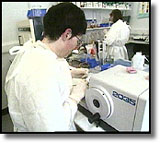
|
New Research Shows Difficulty of Transmitting BSE to HumansScientists have conducted the first laboratory experiment which shows that BSE, or Mad Cow Disease, can only be transmitted to human beings with great difficulty.At the same time, they discovered that the sheep disease scrapie, which is similar to BSE, can make the leap to humans at the molecular level. Since scrapie has never been known to affect humans, it is possible to conclude that the risk of being infected with BSE is minimal in the extreme. According to Dr James Hope, who led the research at the Institute for Animal Health: "It really depends on whether you wear rose-tinted or doom-laden glasses." Dr Hope emphasised that the findings did not prove that BSE could be transmitted to humans outside the laboratory. Other factors would influence the ease of transmission, such as the dose, strain and route of infection.
Beef infected by BSE is believed to have led to a new strain of Creuzfeld-Jakob Disease (CJD), which affects humans. The Department of Health has recorded 19 cases of the new variant of CJD. Dr Hope and his team showed that prion proteins from both BSE and scrapie-infected animal brains were able to convert human prion proteins into the dangerous form. "We have shown that there is a molecular barrier between humans and cows, but it's not an absolute barrier," said Dr Hope. "It is premature to draw firm conclusions from our results about the likelihood of BSE passing to humans, although the results suggest that BSE would be no more inherently transmittable to humans than is sheep scrapie."
explains how difficult it is to transmit BSE to humans The Ministry of Agriculture, which is actively lobbying the EU to lift its ban on British beef, was cautious in its response to the findings. "The results are interesting, but it's too soon to say how conclusive they are. It takes us one small step further on," said a spokeswoman. |
Diana, Princess of Wales, 1961-1997
Conference 97
Devolution
The Archive
News |
Issues |
Background |
Parties |
Analysis |
TV/Radio/Web
Interactive |
Forum |
Live |
About This Site
News |
Issues |
Background |
Parties |
Analysis |
TV/Radio/Web
Interactive |
Forum |
Live |
About This Site
© BBC 1997 |
politics97@bbc.co.uk |

